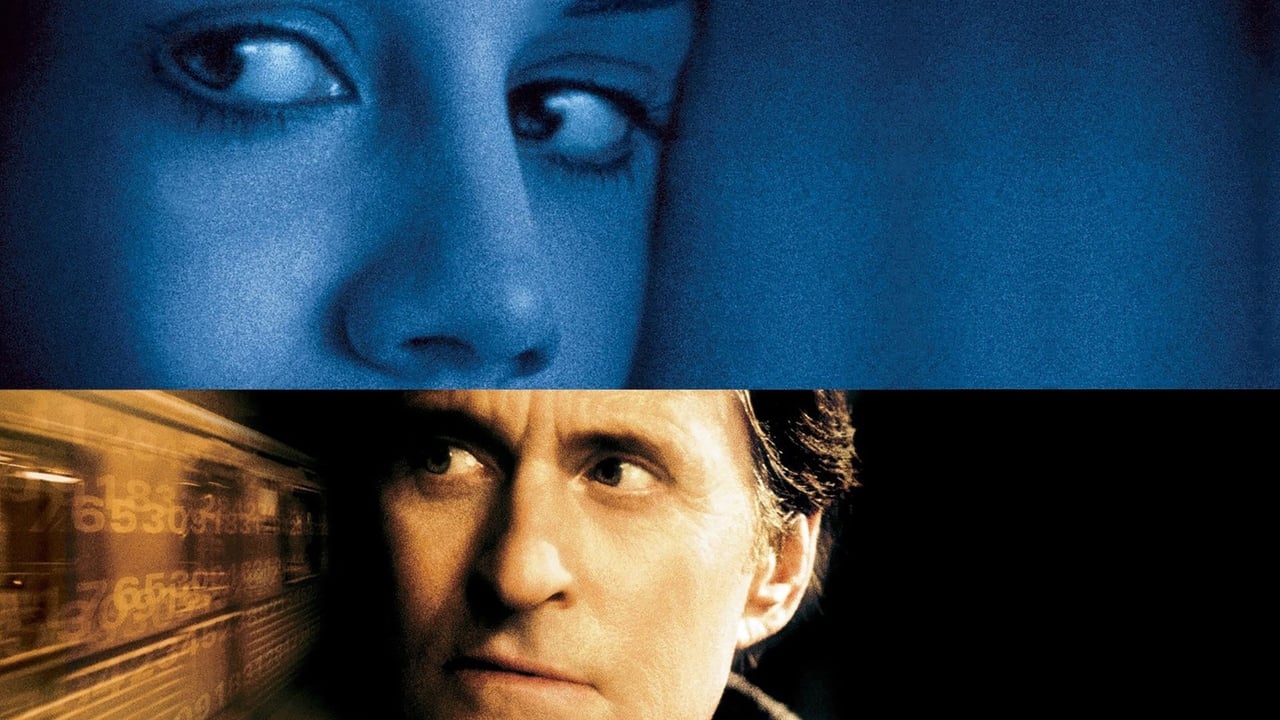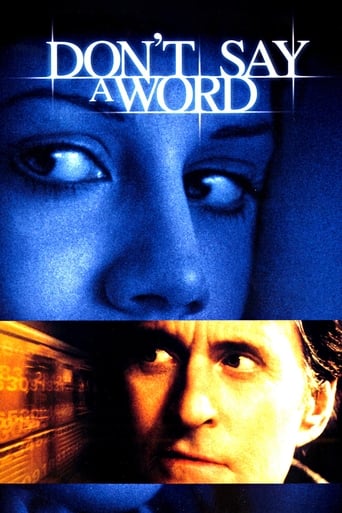

A sad, unfortunate fact about this movie is that the 2 young female stars Brittany Murphy and Skye McCole Bartusiak (who plays the daughter of Michael Douglas) both died in a young age.Anyway, this is a conventional thriller, nothing extraordinary. Although the critics hated it, it manage to become a commercial success doubling its budget in box office.The plot is flimsy and fragile: The daughter of a psychiatrist is kidnapped, and her kidnappers want from his to "extract" a secret from a young woman who is imprisoned in a mental institution, that could lead them to a valuable object they tried to stole some years ago.It starts slow but soon some action picks-up but it becomes exaggerated and coincidental maybe even absurd.Michael Douglas does what he cans to save the movie but doesn't seem enough.Overall: If you can catch it on TV watch it, but never think of paying a single dollar/euro/whatever for it.
... View MoreWell-trussed New York psychiatrist Michael Douglas (as Nathan Conrad) finds his world unraveling, after cute 8-year-old daughter Skye McCole Bartusiak (as Jessie) is kidnapped by psychotic Sean Bean (as Patrick Koster). For ransom, the crooked Mr. Bean wants Mr. Douglas to pry a six-digit number from the disturbed mind of squirrelly patient Brittany Murphy (as Elisabeth Burrows). Douglas wife Famke Jansen (as Aggie) worries from home, due to a broken leg. Somehow, Jennifer Esposito (as Sandra Cassidy) gets herself involved. The film's title advises "Don't Say a Word," when actually, there isn't much to tell. Ms. Murphy is most memorable.***** Don't Say a Word (9/24/01) Gary Fleder ~ Michael Douglas, Brittany Murphy, Sean Bean, Famke Janssen
... View MoreIt is sometimes claimed that male Hollywood stars have a longer shelf-life than their female counterparts, and there seems to be some truth in this statement. There certainly seem to be more leading roles for men in their fifties and sixties than there are for women of the same age. There is, however, a price to be paid for this greater longevity. Modern leading men who prolong their careers into these decades tend to end up being cast in less interesting roles than younger men. Although there are exceptions, notably Clint Eastwood, it is rare to find a male star who can live up, in the second half of his career, to his achievements in the first.Michael Douglas is a case in point. In the late eighties and early nineties he was one of the most talked-about actors in Hollywood. Although there were occasional exceptions (I doubt if many people stood round the water-cooler discussing the merits of "Shining Through"), most of his films from "Romancing the Stone" in 1984 until around the time of "The American President" in 1995 were widely discussed topics of conversation. Many of them were discussed not merely because of their intrinsic merits but also (as in the case of "Fatal Attraction", "Wall Street", "Basic Instinct" or "Falling Down") because of their controversial content. In recent years, although he has continued taking leading roles in films, he has not aroused anything like the same amount of attention; conversations about him around the water-cooler probably concentrate more on his marriage to Catherine Zeta Jones than on his films."Don't Say a Word" is one of Douglas's more recent films. It is thriller of a type which dates back at least as far as Hitchcock's original "The Man who Knew Too Much" from the thirties but which has become very fashionable in recent years. Other recent examples include "Trapped", "Red Eye" and "Firewall". The basic premise is that the villains kidnap or make threats against a member of the hero's family in order to force the hero to assist them in some nefarious scheme. The villains usually want the hero to play some active part in their criminal enterprise rather than simply to pay a ransom (although "Trapped" is an exception in this respect).Douglas plays Dr Nathan Conrad, an eminent New York psychiatrist, whose young daughter Jessie is kidnapped by the villains. Their demand is an unusual one. One of Conrad's patients is a mentally disturbed young woman named Elisabeth Burrows. Locked in Elisabeth's memory is a six-digit number which, it turns out, is the key to the location of a priceless jewel. (Its precise significance does not become clear until near the end of the film). Conrad's task is to try and persuade Elisabeth to divulge this number. He has eight hours in which to accomplish this task, failing which Jessie will be killed. That is the bones of the plot, although there are a number of sub-plots; Conrad's wife Aggie, at home in bed with a broken leg, is menaced by one of the gang, Jessie struggles to free herself from her kidnappers, and a female police detective is on the trail of the villains."Don't Say a Word" is not a bad film, and although there are some plot holes- it is never, for example, made clear how Elisabeth knew the location of the missing jewel, or how the villains knew that she knew- it avoids many of the other flaws which have disfigured a number of recent thrillers. It does not, for example, descend into sadistic vindictiveness in the way that "Trapped" does. Nor does it rely upon a succession of implausible plot twists, inserted for no good reason other than to show off the scriptwriter's cleverness. Some have complained that Famke Janssen is too young and attractive to be married to an older man like Conrad, but in fact she is four years older than Douglas's real-life wife. Douglas, in fact, plays his part well, as do most of the other actors, especially Brittany Murphy as the disturbed Elisabeth. Director Gary Fleder handles the action sequences well and develops a real sense of tension. As another reviewer has pointed out, the atmosphere of the film is close, oppressive and claustrophobic, especially in the final scenes in the Potter's Field graveyard.The problem with the film is that its central premise has been overworked. Familiarity with this sort of plot line has bred contempt, so that even when a relatively good example of this particular sub-genre comes along it can seem hackneyed. Few of Douglas's earlier films were masterpieces, but most of them were at least original enough to arouse the viewer's interest and to remain in his or her memory. "Don't Say a Word", by contrast, is an OK thriller, but not really a memorable one. 6/10
... View More"Don't Say a Word" is the type of contrived, overblown thriller that Hollywood (and apparently, a bulk of American movie audiences) loves, a film that's more than a little ridiculous when you take a step away from it. Despite its obvious big-studio backing and a cast of familiar faces, "Word" works best as a slick, pulpy thriller where lapses in logic, character consistency, and reality all contribute to the bizarre appeal of it all. The film opens with a 1991 bank robbery where Sean Bean is ripped off by two of his own; a decade later, the gang returns to seize the item they lost. The problem? Only a mentally disturbed young woman (Brittany Murphy) purportedly knows its whereabouts. When psychiatrist Michael Douglas reluctantly takes the woman as a patient, Bean and his gang take his daughter, and "Word" becomes a beat-the-clock thriller that, for the most part, moves with fluid efficiency. While certain aspects, like Jennifer Esposito's driven cop and Famke Janssen's bedridden wife seem forcibly shoehorned into the script (by Anthony Peckham and Patrick Smith Kelly) and can be distracting, the core of "Word" is the convincing relationship between Douglas and Murphy, both of whom turn in excellently offbeat performances. Even though the climax takes turns into the unbelievable, it works based on how much we've invested in the duo up to that point. And director-for-hire Gary Fleder keeps things moving at such a brisk clip that questions of narrative logic won't pop up until the credits roll. Put your brain on the shelf and enjoy.
... View More